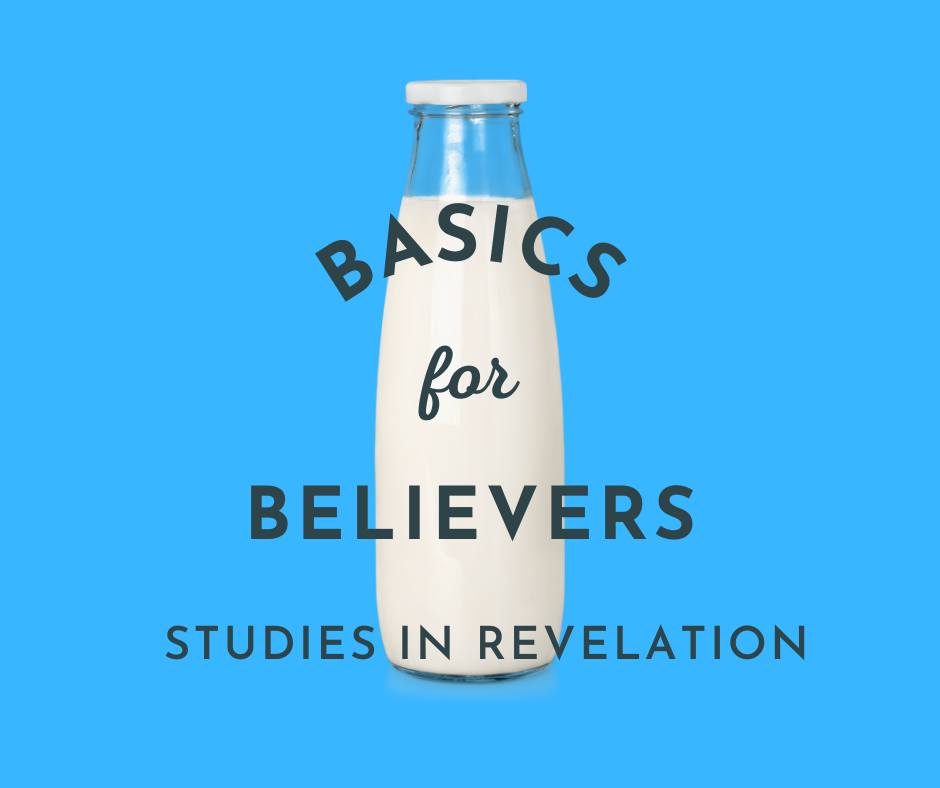APPROACHING A NEW SERMON SERIES IN REVELATION
It is probably fair to say that many Christians are quite hesitant about the book of Revelation. If you need to be persuaded of that, then try dropping into conversation that your church is going to be starting a series on Revelation over the coming months. I can almost guarantee that it will be greeted with a mixture of amusement, surprise and even mild concern. There are probably various reasons why that it is the case.
To begin with, there is a persistent assumption that Revelation is obscure, complex, and the reserve of biblical experts. It perhaps calls to mind someone enthusiastically but unsuccessfully trying to explain their view of the ’end times’ with the aid of a bewildering chart. Then again, connected to that, we also instinctively jump to different views about eschatology (the study of the last things). And, in that light, Revelation can be viewed as a textbook to iron out a host of questions about world events, perhaps being ‘Left Behind’ or different views of the Millennium. And then, finally, if that is not enough to put us off. We might think, well what difference does it make anyway? It doesn’t seem very relevant or practical. I’m not a biblical expert. I’m not really sure what the Millennium even is? I’m only trying to struggle on following Jesus!
Now, before going further, I am not wishing to be overly simplistic. I readily acknowledge that there are challenges in approaching aspects of Revelation. The genre of writing is apocalyptic literature which means it is full of imagery, numbers and biblical illusions. And people will arrive at differing viewpoints due to differing manners of biblical interpretation. However, we must remember that Revelation is not a puzzle to be solved; it’s a vision to be captivated by. And, if we get lost in the details without being gripped by the glorious vision of Jesus then we have spectacularly missed the point!
Here are three things that the Book of Revelation is about:
1. It’s About Jesus
Firstly, the book of Revelation (like the rest of the bible) is about Jesus. It is ‘the revelation of Jesus Christ’ (1.1). It helps to keep that firmly and very clearly in view. And when we do so, it saves us from ever thinking that this could ever be lacking relevance for us or be beyond our reach. God has given us the book of Revelation, because he wants to give us a glorious vision of Jesus Christ. He is ‘the faithful witness, the firstborn from the dead and the ruler of the kings of the earth’ (1.8). And so, when we consider the book of Revelation we are not aridly studying ‘the last things’, but we need to be centred upon ‘the last one’. This climactic book of the bible lifts up the curtain on our perceived reality and affirms to us – despite appearances – that it is Jesus who is in charge! How much we need to hear that today!
2. It’s About Endurance
Secondly, the book of Revelation is not a handbook on eschatology. It’s not written for academics as the basis for speculation and detached eschatological enquiry. No, this letter and vision of Jesus Christ is given to the church as they are suffering for being faithful to Jesus. You see, we miss the point completely if we think Revelation is for biblical experts. It’s most certainly not about becoming an expert – it’s about helping us to endure! The context of the letter makes that abundantly clear. The recipient is the Apostle John who is exiled on the island of Patmos (1.9). He addresses the letter to seven churches and describes himself as ‘your partner in tribulation (which means present affliction) and the kingdom and patient endurance that are in Jesus’ (1.9).
Therefore, we cannot afford to miss that crucial context. John received this vision while suffering for Jesus. Also, the churches that he was writing to were facing the reality of persecution and opposition from the world. So, the point of the vision is to strengthen the church and to enable it to stand firm. That is why the repeated refrain of the letters to the churches in Revelation 2-3 are to: ‘hold fast’, ‘patiently endure’, ‘do not fear’ and ‘repent’. When we catch that context it goes a long way to demystifying this book of the bible. It’s not the realm of experts. It’s not written in an ivory tower. It is written to the church to help them endure in the face of opposition and suffering. Again, how much we need to hear that today!
3. It’s About Final Victory
Third, the book of Revelation is about final victory. It gives us the final score on the last day! In the end, Jesus wins and he brings about the new heavens and the new earth. What could be more relevant? Why would we ever be hesitant about hearing about that? Is there anything that as struggling believers we need to hear more? In the end, Jesus makes all things new. In the end, Jesus, wipes away every tear. In the end, Jesus crushes all that is wrong and evil under his feet. And in the end, God will dwell with his people; He will be their God and they will be his people in the new heavens and the new earth. The book of Revelation is not a book to shrink back from; it is a book to turn to for strength in difficult days. For those reasons, we are starting a series in Revelation at Bothwell in February and March. We will take it in two blocks looking at chapters 1-5 before Easter and then chapters 19-22 in the early summer. And, in light of what is written above we are calling our series: ‘Basics for Believers’. Below is a brief road map to help us navigate chapters 1-5.
An Overview of Chapters 1-5
Chapter 1 – Reality Revealed
In chapter one, the curtain is drawn back and we see the way that things really are. We have a glorious vision of Jesus as ‘the faithful witness, the firstborn form the dead and the ruler of the kings of the earth’ (1.5). Here is the last one, presented in majestic authority, and he has something to say to his suffering church.
Chapter 2 & 3 – Listening to the Voice of Jesus
In Chapter 2-3 we hear the voice of Jesus. These chapters contain seven letters that are addressed to specific churches within modern day Turkey. However, the contents of the letters are not exclusively directed towards them. The repeated refrain is ’he who has an ear, let him hear what the Spirit says to the churches’. Therefore, Jesus is speaking. He addresses his church in plain and urgent terms. There are seven churches, most of them receive a mixture of commendation and rebuke. Smyrna and Philadelphia receive only commendation. Laodecia receives only rebuke. All of the churches receive exhortation to endure and hold fast and they are each given a promise to the one who conquers. In light of this, it is a searching question to ask: what would Jesus say to our church? Do we have ears to hear?
| Church | Exhortation | Conquering Promise |
| Ephesus | Repent and do what you used to do (2.5) | Eat from the Tree of Life (2.7) |
| Smyrna | Do not fear – be faithful unto death (2.10) | Not be hurt by the second death (2.11) |
| Pergamum | Hold fast and repent (2.13/16) | A white stone (2.17) |
| Thyatira | Hold fast what you have until I come! (2.25) | The morning star (2.28) |
| Sardis | Wake up and strengthen what remains! (3.2) | Name in the book of life (3.5) |
| Philadelphia | Endure patiently and hold fast! (3.10/11) | A pillar in the temple of my God (3.12) |
| Laodicea | Be Zealous & Repent! (3.19) | Sit with me on my throne (3.21) |
There is little that is difficult to understand about the message to the churches. The difficulty lies in doing what Jesus says. That is why the ‘letters to the churches’ are followed by a glorious vision of the throne in heaven in chapters 4 and 5.
Chapter 4 & 5 – Looking at a Vision of Jesus
The flow of the text moves from a voice to a vision. In Revelation 4 and 5 there is a glorious vision of the throne in heaven and the one seated on the throne. There is much to take in: ‘twenty-four elders’, ‘living creatures’ and ‘flashes of lightning, rumbling and peals of thunder’. It would be easy to get distracted by all the details. But, the point of this vision is not to get lost or speculate over the details. It is crucial to remember that they are directly linked to what has come before.
In the previous chapters Jesus has given his church plain instruction to endure and hold fast. The vision that follows this is intended to help us to do exactly that. The proper response to this vision is to be captivated by the glory and the reality of heaven so that we are strengthened to do what Jesus says! The central point is that Jesus has conquered and that he is worthy to receive honour and glory and blessing. Therefore, let’s not get lost in the details; let’s allow the glory and beauty of this vision to grip us and enable us to patiently endure and hold fast. In a few months, we will perhaps write more about understanding the imagery of Revelation and the concluding chapters of the book after Easter. But that will suffice as an introduction to chapters 1 to 5.
So, to draw things to a close, if you are looking for a series in Revelation with charts and speculation about world events you are going to be disappointed. There is not going to be much of that. However, if you don’t feel like much of an expert and want to be helped to endure following Jesus in a dark world then there will be much here for you. The big idea is not to try and solve the puzzle, that’s not what Revelation is about. Instead, we want to be gripped by this glorious vision of Jesus so that we can patiently endure.
Amen. Come, Lord Jesus.



